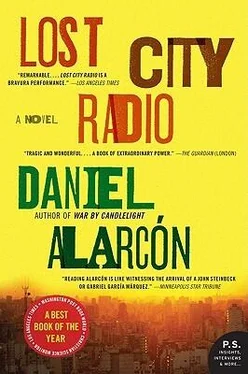“Of course.”
“And in the city,” Zahir said, “everything was fine?”
Manau met his landlord’s gaze. His son would leave, if not now, soon. He would starve. His wife and his daughter, too. The town, with any luck, would disappear into the jungle. Manau shook his head. “No, you’re right. In the city everything was—”
“Terrible,” the captain said. He smiled. “Pardon me, good sir. But let it be said: everything was terrible.”
Manau nodded. “I’m sorry, Zahir. I didn’t mean to interrupt.”
“That’s all of it. They took my hands! And yet I am not a helpless man.”
“Of course not, Don Zahir,” murmured the captain.
“And do you know what I miss most?” Zahir asked in a low voice. He leaned in close.
“Playing guitar,” one of the other men said. “Don Zahir, you could play beautifully!” He sang a tra-la-la , a rising melody, and lovingly stroked an invisible instrument.
“No, no, that’s not it.”
“The earth, fertile and damp, in your hands.”
Zahir shook his head. “You talk like a bad poet!”
“What then?” Manau asked.
“I’ll tell you.” He threw an arm over Manau, another around the captain. “My fingers,” Zahir whispered, “inside my wife.”
“No!” the captain protested, overjoyed.
“Yes!”
“Don Zahir! What vulgarity!”
But he had the face of an oblate praying for grace. Manau sat in awe. He would have lent Zahir his own hands for a night of love, if such a thing were possible.
“She was so wet,” Zahir said, “and so warm…Dear God!”
“To women!” the captain said.
“To women!” shouted the roomful of men.
And even outside, a few of the children saluted as well. The girls among them blushed and curtsied.
“I’m still a girl,” said Joanna, smiling beatifically.
“Victor, are you okay?” Nico asked for the hundredth time. He was starting to worry.
Inside, Nico’s father fell silent, and Manau felt a warmth descending from above, something narcotic. The glass was passed to him again. No one mentioned the beer truck or the impassable roads. They would drink it all. What is tomorrow? An idea, nothing more.
WHEN VICTOR was carried into the canteen a few minutes later, the men and the soldiers were still in ecstasies over Zahir’s revelation. The radio played unaccompanied by a single voice, each man plunged into private ruminations of warm vaginas they had known. Years ago, decades ago, it didn’t matter how long it had been; the smell and the sheen of imagined sex was everywhere in the room. They looked at their hands and fingers with hopeless devotion. Beer had been spilled in great quantities, the floor now wet enough to skate on.
All around Manau, men dreamed lustily. The captain and Zahir whispered conspiratorially about the pleasures of the flesh. A few of the soldiers had fallen asleep, splayed out on the floor, musty boots beneath their heads as pillows. Manau was done with memory’s women; they were few anyway. He looked up to find Nico standing awkwardly in the doorway, with Adela’s boy, limp and dazed, in his arms.
Victor was a frail and sickly child. It wasn’t something that Manau had always recognized. He was a smiling, good-natured kid, and his mother kept him clean and neatly dressed. But now Manau was sure he had never seen such a fragile human being.
“I fell,” Victor said, before Manau had a chance to ask. “Will someone call my mother?”
The child’s voice was enough to blot out waking dreams. The captain snapped to attention, his face contorted in an exaggerated expression of worry. These army men love a crisis, Manau thought. But Zahir was up at once, took Victor from his son. The boy’s thin arms slung around the older man’s neck. “You’ll be fine,” Zahir said. With his right stump, he patted the boy’s head.
“I pushed him,” Nico said. “It was my fault.”
But no one was listening. The captain was up. “We’re taking the boy home,” Zahir said.
“Will he be okay?” Nico asked.
“Yes,” Manau said quickly. “He’ll be fine.”
“He won’t die?”
“Of course not.” Manau paused.
Nico nodded.
He wasn’t a boy anymore. He could be reasoned with. The bar had emptied, and they were alone. “You can’t leave,” Manau said. “Not now. Victor told me everything. And I forbid it.”
Manau let that final grand statement linger there. I forbid it. It had authority, weight. “Do you understand me?”
Nico nodded.
“Do you have anything to say?” Manau asked.
But he didn’t. Or wouldn’t. So Manau left him in the empty canteen and went off into the night to see about Adela’s boy.
HIS HOME wouldn’t be this crowded again until his mother died. Then he would once again be the center of attention, women and friends and strangers huddled around him, afraid to speak, afraid not to. But this night, the night before Nico left, a drunk army captain told him he was a tough boy, a true son of the homeland. This night, his best friend’s handless father carried him through town, and his nervous, frightened teacher kept pace, scratching himself as discreetly as he could. A midnight procession beneath an infinity of stars, and the children followed, worried for their classmate. They sang songs, they saluted women. They’d tried to rouse him unsuccessfully by the canteen wall, before Nico had finally said, “Enough, I’ll take him.” In the end, it had for Victor that same movement and madness that his mother’s death would have — except this was a celebration. He was the center of the world. A battalion of soldiers stood guard outside his door. Don Zahir dropped him in his bed. Victor heard his mother’s voice, too concerned to scold him. Warm rags were placed on his forehead, and he dreamed of a helicopter made of silver light. The old women appeared by his bedside, uttering prayers in the old dialect.
Did he whisper in Don Zahir’s ear, did he tell him Nico was leaving? He meant to. Later, he told himself he had. It was no use: in the morning, his best friend was gone.
SHE HAD held it in her hands, glanced over the names: not one had registered. How had she not seen it that first day? While Victor played in the control room, pressing buttons and turning knobs haphazardly, Len watching over him, Elmer took the list and pulled out a black felt-tip marker. Norma gasped. What was worse: realizing Rey’s name was there, that she had somehow missed it, or seeing it disappear again?
“Wait. Let me see it.” She reached for Elmer’s hand. “Why do that?”
“It’s not safe.”
“Let me hold it.”
He relented with a sigh and passed her the paper. “Did you know about this?” he asked.
Norma spread the list across her thigh, smoothing its wrinkles with the palms of her hands. “Of course not,” she said, without looking up. “I never know.” She ran her fingers over the letters of her husband’s name. It was there, Rey’s false name hidden among two dozen others. “Did you?”
He shook his head. “I’m sorry, Norma,” Elmer said. “Either I destroy it or we go to the police. This list — they could be collaborators, sympathizers. Rey is still a wanted man.”
Even if he’s dead.
And so everything would be canceled, the list never read, no special program for Victor or the rest of them, the sons and daughters of 1797, with no one to tend to their memory. People disappear, they vanish. And with them, the history, so that new myths replace the old: the war never happened at all. It was just a dream. We are a modern nation, a civilized nation. But then, years later, a tiny echo of those missing. Do you ignore it?
Читать дальше












